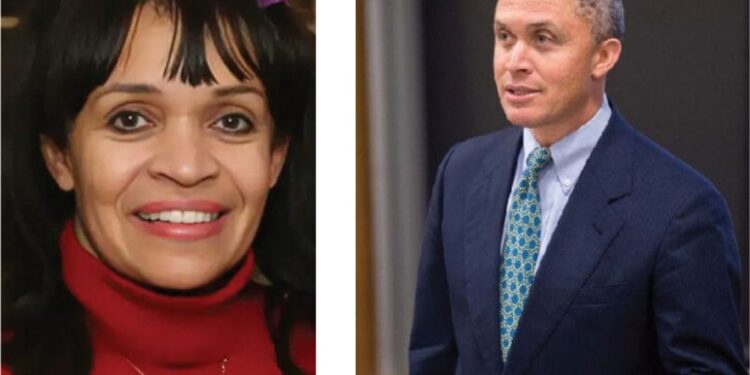In the complex and storied history of American political families, much of the spotlight often shines on the men in power and their direct successors. However, behind many prominent figures are individuals whose contributions are less publicized yet no less significant. One such figure is Dorothy Bowles Ford, the former wife of Congressman Harold Ford Sr. and the mother of Harold Ford Jr., a former U.S. Congressman and influential political voice in his own right. While much of the media coverage has centered around the political milestones of the Ford men, Dorothy’s story remains largely untold — despite her undeniable influence on one of Tennessee’s most iconic political families. This article dives deep into the life, legacy.
Quick Bio
| Attribute | Details |
| Full Name | Dorothy Bowles Ford |
| Known For | Former wife of Congressman Harold Ford Sr.; Mother of Harold Ford Jr. |
| Nationality | American |
| Ethnicity | African-American |
| Marital Status | Divorced from Harold Ford Sr. |
| Children | 5 (including Harold Ford Jr.) |
| Profession | Educator and Family Matriarch (primarily private life) |
| Key Contributions | Supportive role in the Ford political legacy; emphasis on education & values |
| Public Appearances | Rare; Maintains a low public profile |
| Current Status | Living privately outside the public spotlight |
Early Life: A Foundation Built on Strength and Education
Dorothy Bowles Ford was born into a strong African-American family during a period marked by social upheaval and racial inequality in America. Although detailed public records about her childhood are scarce, it is known that she grew up in a deeply segregated society where African-Americans had to work twice as hard for half the recognition. Like many women of her generation, she focused on education, family, and social justice as pathways to empowerment and change. These values would later become deeply woven into the fabric of her children’s lives, particularly that of Harold Ford Jr., who often credited his parents for instilling in him a strong sense of responsibility and commitment to community.
Dorothy’s academic background and personal discipline gave her the grounding she needed to support a partner in public office while raising a politically aware and civically engaged family. While her husband made headlines, Dorothy remained a stabilizing force at home, often acting as both parent and educator to their five children.
Marriage to Harold Ford Sr.: A Union of Shared Vision and Struggles
Dorothy Bowles married Harold Ford Sr. in the late 1960s, just as he was embarking on a political career that would make him the first African-American congressman from Tennessee since Reconstruction. Their union symbolized a progressive step forward for Black leadership in the American South, and Dorothy was there for the ride — through the campaign trails, policy debates, and Washington’s rigorous demands.
Being the spouse of a pioneering Black congressman came with both prestige and pressure. Dorothy had to navigate the high expectations placed on political families while also dealing with the harsh realities of racism, public scrutiny, and the sacrifices required by a political career. Despite these challenges, she maintained her dignity and fulfilled the demanding dual role of political spouse and mother to five children — a balancing act that requires incredible emotional strength and logistical mastery.
The Role of Motherhood: Nurturing the Next Generation of Leaders
Perhaps Dorothy’s most enduring legacy is her influence as a mother. Among her five children is Harold Ford Jr., who would go on to serve in the U.S. House of Representatives from 1997 to 2007, becoming one of the youngest and most prominent African-American politicians in modern history. His polished public persona, articulate speech, and intellectual rigor are qualities that many credit to his upbringing — particularly the guidance he received from his mother.
Dorothy was not only a caregiver but an active participant in her children’s education and moral development. She emphasized discipline, hard work, and a commitment to excellence. She believed that to succeed in a world that was often unfair to people of color, her children had to be twice as prepared and infinitely more determined. Her insistence on high standards laid the groundwork for Harold Jr.’s political ascent and professional success.
Life After Divorce: A Quiet Resilience
Dorothy and Harold Ford Sr. eventually divorced in the 1990s, bringing to a close a high-profile marriage that had spanned several decades. However, unlike many public separations, theirs was marked by relative dignity and discretion. Dorothy did not publicly air grievances or seek the media spotlight. Instead, she focused on her family and personal growth, continuing to live a life of quiet influence.
Divorce can be a destabilizing force, especially after decades of marriage, but Dorothy adapted with grace. She continued to be a central figure in the lives of her children and maintained a sense of normalcy that helped shield them from the emotional toll such transitions often bring. Her ability to remain composed and committed to her family, even in the face of personal change, is a testament to her inner strength.
Contributions Outside the Spotlight
While much of the public’s attention has remained fixed on her former husband and politically active son, Dorothy Bowles Ford has made significant contributions of her own — albeit behind the scenes. She has been involved in educational initiatives, community-building efforts, and has served as a role model for many African-American women striving to balance family responsibilities with broader social engagement.
Though she never sought elected office or public acclaim, Dorothy’s influence can be seen in the values and accomplishments of her children, particularly in their advocacy for educational equity, civil rights, and responsible governance. In many ways, her role mirrors that of countless women in political families: the silent architects of public success stories.
A Matriarch of Substance: Legacy Through Generations
Dorothy Bowles Ford’s legacy isn’t confined to her immediate family. As the matriarch of a family deeply rooted in public service, her values have permeated through generations. From her children to her grandchildren, the ripple effect of her nurturing and guidance continues to shape lives. Her family remains active in law, politics, and business — all fields that require the type of discipline and ethical foundation she championed.
In the African-American community, where matriarchs often hold families together through faith, resilience, and unconditional support, Dorothy stands as a prime example. She represents a generation of women who, despite limited opportunities and systemic obstacles, forged paths for their families through sheer determination and love.
The Impact on Harold Ford Jr.’s Political Career
Though Harold Ford Jr. has often been seen as a political prodigy, much of his character and professional demeanor can be traced back to the environment his mother helped create. Her insistence on integrity, hard work, and emotional intelligence shaped the man who would later challenge long-held political norms and stereotypes in Washington, D.C.
Dorothy Bowles Ford didn’t just raise a congressman — she raised a thoughtful, well-prepared leader who understood the value of public service from a young age. In interviews, Harold Jr. has often alluded to his mother’s role in grounding him, even as his career soared. While political fathers often grab headlines, it is clear that Dorothy’s steady hand helped write the prologue of her son’s success story.
Life Today: Privacy, Dignity, and Continued Influence
Today, Dorothy Bowles Ford lives a relatively private life, far from the public eye that once surrounded her family. Unlike some political spouses who transition into public roles of their own, she chose to return to a life focused on family and personal fulfillment. This decision underscores her character — a woman who never sought fame but was instrumental in helping others achieve it.
Despite her absence from headlines, she continues to be a respected figure in Memphis and beyond. Her story serves as a reminder that real influence often takes place away from cameras, behind closed doors, in living rooms and classrooms, through quiet conversations and steady leadership.
Why Dorothy Bowles Ford’s Story Matters
The story of Dorothy Bowles Ford is a necessary addition to the broader narrative of Black women in America who have supported and shaped political dynasties without ever receiving the recognition they deserve. Her life reminds us that history isn’t only written by those in office but also by those who raise, influence, and sustain them. Dorothy represents millions of women who work tirelessly behind the scenes to ensure the success of their families and communities.
In an age where personal branding and public personas dominate the political landscape, Dorothy’s humility, dedication, and private strength are refreshing. She reminds us that legacy is not just about public accolades but about the values and people we leave behind.
Frequently Asked Questions (FAQs)
1. Who is Dorothy Bowles Ford?
- Dorothy Bowles Ford is the former wife of Congressman Harold Ford Sr. and the mother of Harold Ford Jr., a former U.S. Representative. She is known for her quiet yet profound influence on her politically active family.
2. Was Dorothy Bowles Ford involved in politics?
- While not directly involved in elected office, Dorothy played a significant behind-the-scenes role in supporting her husband’s and son’s political careers, especially through family and educational support.
3. How many children does Dorothy Bowles Ford have?
- She has five children, including Harold Ford Jr., who served in the U.S. House of Representatives from 1997 to 2007.
4. Is Dorothy Bowles Ford still alive?
- As of the latest available information, Dorothy Bowles Ford is alive and living a private life, largely out of the public eye.
5. What is Dorothy Bowles Ford’s legacy?
- Her legacy lies in her commitment to family, education, and community. She is remembered as a matriarch who played a key role in shaping one of Tennessee’s most influential political families.


















